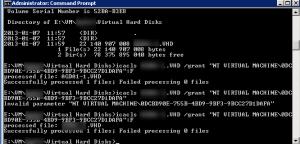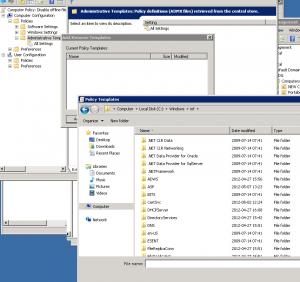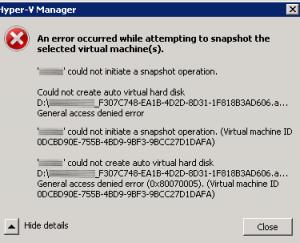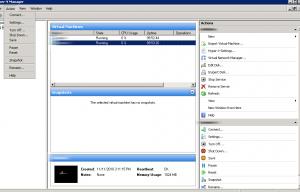
zeezam
MemberContent Type
Profiles
Forums
Events
Everything posted by zeezam
-
Hello! I'm using wsus to deploy patches to my windows 7 clients. Some of the clients forced a reboot after installation of updates with this message in the log; Launched new AU client for directive 'Forced Reboot'. I have enabled No auto-restart for scheduled Automatic Updates Installations. Any ideas? Is there anything that override that setting?
-
Migrated the virtual server to windows server 2008 and solved the problem.
-
-
Thanks. I installed the templates. The adml files are now located under C:\Program Files (x86)\Microsoft Group Policy\win72008r2\PolicyDefinitions\en-us. If I try to open the templates in Group Policy Management Editor it can't find the file types in the folder above. Any ideas?
-
I trying to create an gpo that remove offline files in windows 7. Where do I find the admx files on the local computer that creates the gpo?
-
I have successfully exported a hyper-v guest to another machine. However, when I try to create a snapshot for the guest on the new host I got Generel access denied error. It works flawless for my other hyper-v guests that I also have exported from another host. Any ideas?
-
Yes. It seems to be problem with the symantec client.
-
Having this issue several times for our users. Something makes the windows profile corrupt so they got logged in as a temporary profile. This is what I can find in the event log: Is it Symantec that causing the trouble?
-
Hyper-V reports: The operation on computer 'localhost' failed
zeezam replied to zeezam's topic in Windows Server
This did work without taking down any VM. -
After starting the virtual guest on a new host I have to activate the product key again and the key is already in use. Any ideas about that? It's a windows 2008 sp2 machine...
-
Ok. Sometimes it works with just stop the VM. Copy the vhd files and startup the vm on another host...
-
I want to move a hyper-v vm to another machine but can't find the export function. As described in this article I should find the function under action menu; http://blogs.msdn.com/b/virtual_pc_guy/archive/2008/08/26/hyper-v-export-import-part-1.aspx I can't find it there.
-
The trust relationship between this workstation and primary domain fai
zeezam replied to zeezam's topic in Windows Server
Ok. Not what I know. Is there anything I can check or any policy I can set for this? -
Before I saw your post this worked for me: * Extended with hyper-v. * Filecopy of the .vhd file. * Mounted .vhd on my windows 7 machine, extended the partition. Unmounted .vhd. * Created a new hyper-v machine and used the new .vhd. Thanks!
-
I have a windows 2003 installed as a hypver-v guest on a .vhd file. The system partition is getting full and I want to extend it. I have added more disk via the hyper-v host but I can't extend the partition on the windows 2003 server. I have tried with diskpart. I have also tried mounted the .vhd on my windows 7 machine and extended the disk but then it got BSOD when I start it. Any ideas?
-
It did the trick!
-
Ok. This must have something to do with how windows 2008 start the script or something, because if I run it manually it works. The same script did work on a windows 2003 as a schedule task.
-
I have created a script that copy and move a file with wget. I saved the script in .cmd. If I manually run the script it works. I have created a task in windows 2008 that will run the job every week. The job seems to run in the job history but it doesn't do it's job. Any ideas? How to track down this?
-
It seems to work so far with disable LLT. I can't disable those with gpo in 2003 dc. Is there any registry settings I can put in a login script?
-
Here you go, http://www.mediafire.com/?pwdgds35judmws9 Edit: I ran the MEMORY.DMP in WinDbg and got following: Microsoft (R) Windows Debugger Version 6.12.0002.633 AMD64 Copyright (c) Microsoft Corporation. All rights reserved. Loading Dump File [C:\Users\sys\Desktop\MEMORY.DMP] Kernel Summary Dump File: Only kernel address space is available Symbol search path is: *** Invalid *** **************************************************************************** * Symbol loading may be unreliable without a symbol search path. * * Use .symfix to have the debugger choose a symbol path. * * After setting your symbol path, use .reload to refresh symbol locations. * **************************************************************************** Executable search path is: ********************************************************************* * Symbols can not be loaded because symbol path is not initialized. * * * * The Symbol Path can be set by: * * using the _NT_SYMBOL_PATH environment variable. * * using the -y <symbol_path> argument when starting the debugger. * * using .sympath and .sympath+ * ********************************************************************* *** ERROR: Symbol file could not be found. Defaulted to export symbols for ntkrnlmp.exe - Windows 7 Kernel Version 7601 (Service Pack 1) MP (2 procs) Free x64 Product: WinNt, suite: TerminalServer SingleUserTS Built by: 7601.17640.amd64fre.win7sp1_gdr.110622-1506 Machine Name: Kernel base = 0xfffff800`02a11000 PsLoadedModuleList = 0xfffff800`02c56670 Debug session time: Wed Nov 2 22:04:27.235 2011 (UTC + 1:00) System Uptime: 0 days 3:32:18.827 ********************************************************************* * Symbols can not be loaded because symbol path is not initialized. * * * * The Symbol Path can be set by: * * using the _NT_SYMBOL_PATH environment variable. * * using the -y <symbol_path> argument when starting the debugger. * * using .sympath and .sympath+ * ********************************************************************* *** ERROR: Symbol file could not be found. Defaulted to export symbols for ntkrnlmp.exe - Loading Kernel Symbols ............................................................... ................................................................ ......................................... Loading User Symbols Loading unloaded module list ...... ******************************************************************************* * * * Bugcheck Analysis * * * ******************************************************************************* Use !analyze -v to get detailed debugging information. BugCheck A, {0, 2, 0, fffff80002ffc477} *** ERROR: Symbol file could not be found. Defaulted to export symbols for hal.dll - *** ERROR: Symbol file could not be found. Defaulted to export symbols for ndis.sys - *** ERROR: Module load completed but symbols could not be loaded for NETw5s64.sys *** ERROR: Symbol file could not be found. Defaulted to export symbols for vwififlt.sys - *** ERROR: Module load completed but symbols could not be loaded for nwifi.sys *** ERROR: Module load completed but symbols could not be loaded for pacer.sys *** ERROR: Module load completed but symbols could not be loaded for tcpip.sys ***** Kernel symbols are WRONG. Please fix symbols to do analysis. ************************************************************************* *** *** *** *** *** Your debugger is not using the correct symbols *** *** *** *** In order for this command to work properly, your symbol path *** *** must point to .pdb files that have full type information. *** *** *** *** Certain .pdb files (such as the public OS symbols) do not *** *** contain the required information. Contact the group that *** *** provided you with these symbols if you need this command to *** *** work. *** *** *** *** Type referenced: nt!_KPRCB *** *** *** ************************************************************************* ************************************************************************* *** *** *** *** *** Your debugger is not using the correct symbols *** *** *** *** In order for this command to work properly, your symbol path *** *** must point to .pdb files that have full type information. *** *** *** *** Certain .pdb files (such as the public OS symbols) do not *** *** contain the required information. Contact the group that *** *** provided you with these symbols if you need this command to *** *** work. *** *** *** *** Type referenced: nt!KPRCB *** *** *** ************************************************************************* ************************************************************************* *** *** *** *** *** Your debugger is not using the correct symbols *** *** *** *** In order for this command to work properly, your symbol path *** *** must point to .pdb files that have full type information. *** *** *** *** Certain .pdb files (such as the public OS symbols) do not *** *** contain the required information. Contact the group that *** *** provided you with these symbols if you need this command to *** *** work. *** *** *** *** Type referenced: nt!_KPRCB *** *** *** ************************************************************************* ************************************************************************* *** *** *** *** *** Your debugger is not using the correct symbols *** *** *** *** In order for this command to work properly, your symbol path *** *** must point to .pdb files that have full type information. *** *** *** *** Certain .pdb files (such as the public OS symbols) do not *** *** contain the required information. Contact the group that *** *** provided you with these symbols if you need this command to *** *** work. *** *** *** *** Type referenced: nt!KPRCB *** *** *** ************************************************************************* ************************************************************************* *** *** *** *** *** Your debugger is not using the correct symbols *** *** *** *** In order for this command to work properly, your symbol path *** *** must point to .pdb files that have full type information. *** *** *** *** Certain .pdb files (such as the public OS symbols) do not *** *** contain the required information. Contact the group that *** *** provided you with these symbols if you need this command to *** *** work. *** *** *** *** Type referenced: nt!_KPRCB *** *** *** ************************************************************************* ************************************************************************* *** *** *** *** *** Your debugger is not using the correct symbols *** *** *** *** In order for this command to work properly, your symbol path *** *** must point to .pdb files that have full type information. *** *** *** *** Certain .pdb files (such as the public OS symbols) do not *** *** contain the required information. Contact the group that *** *** provided you with these symbols if you need this command to *** *** work. *** *** *** *** Type referenced: nt!_KPRCB *** *** *** ************************************************************************* ************************************************************************* *** *** *** *** *** Your debugger is not using the correct symbols *** *** *** *** In order for this command to work properly, your symbol path *** *** must point to .pdb files that have full type information. *** *** *** *** Certain .pdb files (such as the public OS symbols) do not *** *** contain the required information. Contact the group that *** *** provided you with these symbols if you need this command to *** *** work. *** *** *** *** Type referenced: nt!_KPRCB *** *** *** ************************************************************************* ************************************************************************* *** *** *** *** *** Your debugger is not using the correct symbols *** *** *** *** In order for this command to work properly, your symbol path *** *** must point to .pdb files that have full type information. *** *** *** *** Certain .pdb files (such as the public OS symbols) do not *** *** contain the required information. Contact the group that *** *** provided you with these symbols if you need this command to *** *** work. *** *** *** *** Type referenced: nt!_KPRCB *** *** *** ************************************************************************* Probably caused by : NETw5s64.sys ( NETw5s64+b76b ) Followup: MachineOwner --------- Seems to be the wifi driver? I updated the Intel driver to 13.5.0.6 and then ran a ftp transfer like before when I got bsod and now it seems to work. I'll update the thread if I got bsod again...
-
What makes you think that would help? I'll make a try Any event logs or something I can check next time it happens? Edit: Is it possible to turn off in registry?
-
Have a fresh windows 7 64bit install on a lenovo x200s. Got bsod when doing some ftp transfer for example. Here is the event log Log Name: System Source: Microsoft-Windows-WER-SystemErrorReporting Date: 2011-11-02 18:32:34 Event ID: 1001 Task Category: None Level: Error Keywords: Classic User: N/A Computer: none Description: The computer has rebooted from a bugcheck. The bugcheck was: 0x000000d1 (0x0000000000000030, 0x0000000000000002, 0x0000000000000000, 0xfffff8800584a394). A dump was saved in: C:\Windows\MEMORY.DMP. Report Id: 110211-20592-01. Event Xml: <Event xmlns="http://schemas.microsoft.com/win/2004/08/events/event"> <System> <Provider Name="Microsoft-Windows-WER-SystemErrorReporting" Guid="{ABCE23E7-DE45-4366-8631-84FA6C525952}" EventSourceName="BugCheck" /> <EventID Qualifiers="16384">1001</EventID> <Version>0</Version> <Level>2</Level> <Task>0</Task> <Opcode>0</Opcode> <Keywords>0x80000000000000</Keywords> <TimeCreated SystemTime="2011-11-02T17:32:34.000000000Z" /> <EventRecordID>4882</EventRecordID> <Correlation /> <Execution ProcessID="0" ThreadID="0" /> <Channel>System</Channel> <Computer>none</Computer> <Security /> </System> <EventData> <Data Name="param1">0x000000d1 (0x0000000000000030, 0x0000000000000002, 0x0000000000000000, 0xfffff8800584a394)</Data> <Data Name="param2">C:\Windows\MEMORY.DMP</Data> <Data Name="param3">110211-20592-01</Data> </EventData> </Event> Memory problem?
-
We have DFS setup and after we upgrade our clients to windows 7 they got problem with accessing the dfs share sometimes. Works fine with windows xp. The file server is a Windows 2008 R8 and our AD domain Windows 2003. We have mapped the share with a loginscript for our clients. Sometimes the share gets inaccessible for the user, or when accessing the share - windows explorer "jumps" back to My Computer. Any ideas? We have tried with changing this registry value but no success. Windows Registry Editor Version 5.00 [HKEY_LOCAL_MACHINE\SYSTEM\CurrentControlSet\Control\Lsa] "lmcompatibilitylevel"=dword:00000001




